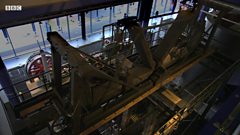James Watt: The power of steam
The life and work of the Scottish engineer whose ingenuity transformed industry.
In this 200th year since his death, we look at the life and work of James Watt, the Scottish innovator whose ground-breaking ideas helped power the Industrial Revolution and lay the basis for much of the mechanised world we take for granted now. He wasn't the inventor of the first steam engine - that had existed before his time - but his improved steam engine was vastly more efficient than earlier versions. As a result, industrial production rates soared and workplaces were transformed by new machines: changes that were to revolutionise society as well as industry. So who was James Watt? What inspired him and who helped him?
Bridget Kendall talks to historians Dr. Malcolm Dick, Director of the Centre for West Midlands History at the University of Birmingham, and Professor Larry Stewart from the University of King's College in Halifax, Nova Scotia, who specialises in early modern science. She is also joined by curators Val Boa from The McLean Museum in Greenock, Scotland that houses an important James Watt collection, and Ben Russell, Curator of Mechanical Engineering at the Science Museum in London where he looks after a number of Watt-related objects, including his legendary attic workshop.
Steam escaping from a pressure gauge. (mevans/Getty Images)
Last on
Clip
Broadcasts
- Thu 27 Jun 2019 08:06GMT����ý World Service
- Thu 27 Jun 2019 23:06GMT����ý World Service
- Sat 29 Jun 2019 13:06GMT����ý World Service News Internet
- Sun 30 Jun 2019 14:06GMT����ý World Service except Americas and the Caribbean, East Asia & South Asia
- Mon 1 Jul 2019 02:06GMT����ý World Service UK DAB/Freeview
- Mon 1 Jul 2019 03:06GMT����ý World Service Online, Australasia, Americas and the Caribbean, South Asia & East Asia only
Featured in...
![]()
Technology and innovations—The Forum
Machines, materials and methods that changed how the world works
Podcast
-
![]()
The Forum
The programme that explains the present by exploring the past




